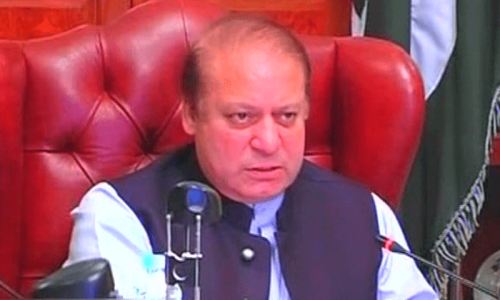KARACHI: The PML-N has hinted at “making changes” to the 18th Constitutional Amendment with key focus on reshaping the revenue distribution mechanism among provinces, sources privy to the development told Dawn.
The manifesto committee has received several proposals, ranging from reversing the 18th Amendment altogether to changing the distribution mechanism of financial resources among provinces.
The party is set to enter the election campaign with the promise to amend the constitutional provision and also make it part of its manifesto, set to be unveiled next month.
The 18th Amendment, passed during the PPP-led government in 2010, devolved powers to provinces in key areas of public services, including health, women development, social welfare and local government.
Party leaders rule out reversal, hint at ‘key changes’ in resource distribution
Under the Amendment, provinces’ share of federal resources was set at 57.5 per cent. The federal government would spend the remaining on debt servicing, development programmes, defence, etc.
“There’s a very strong feeling, rather conviction, among the party’s top leadership that the current arrangements of financial resources distribution among the provinces [under the 18th Amendment to the Constitution] has created unsustainable financial problems,” said a PML-N source.
The PML-N leadership, which recently set up a committee to draft the manifesto for the Feb 8 polls, is “seriously toying with ideas and proposals” it has received from party members.
“So far, it’s believed that the party would not go for an outright reversal of the 18th Amendment, but it would address its key features and reshape the distribution mechanism of financial resources among the provinces. You would hopefully see it as part of the PML-N manifesto,” said the source.
While talking to Dawn, a senior PML-N leader confirmed that several such proposals were under consideration.
One of them suggested the National Finance Commission’s (NFC) restructuring to ensure that resources transferred to provinces reach grassroots levels, i.e. local government in cities, the senior leader added.
Senator Irfan Siddiqui, who is heading PML-N’s manifesto committee, and party spokesperson Marriyum Aurangzeb did not respond to Dawn’s repeated requests for comments.
Meanwhile, another party leader said that recent meetings between leaderships of PML-N and other parties to form electoral alliances further encouraged the party’s high command to go for “massive reforms” in every key area of governance for the smooth functioning of the state.
“The party, through these reforms, which would be proposed in the manifesto, aims to contain corruption and better civic amenities reaching the people at the grassroots level.”
“In the name of provincial autonomy, we have seen that provinces are absolved after receiving their share under the NFC award, while payment of interest and principal instalments of loans, provision of money under the defence budget, matters of deficit-hit national institutions, payment of current account deficit and many other financial affairs become centre’s sole responsibility,” added the PML-N leader.
He referred to the media talk of another senior party leader, Khawaja Saad Rafiq, after meeting with MQM-P leaders in Karachi, where he clearly hinted at constitutional reforms for an improved justice system and transfer of power at the grassroots level to empower local governments.
PPP’s concerns
The PPP, which takes credit for the Amendment and calls it “an achievement”, has robustly resisted any changes proposed in the provision.
Senior party leaders have also expressed apprehension that “conspiracies are afoot to roll back the amendment”.
These fears might materialise if PML-N — which was PPP’s ally in the centre till three months ago — comes into power after the general elections on Feb 8.
However, the party has vowed to “resist such a move with full force.”
While reacting strongly to PML-N’s proposed plans, PPP said Nawaz Sharif would only “make his political future bleak” through such moves.
The demands for making changes to the 18th Amendment have been reverberating in the corridors of power for the past few years.
During their government from 2018 to 2022, former prime minister Imran Khan and key PTI leaders have repeatedly proclaimed their desire to fix the anomalies in the resource distribution mechanism.
In 2020, ex-PM Khan said the 10-year-old amendment “needed to be fixed” along with the NFC. He said several administrative issues have arisen after the Amendment, and the centre was helpless in fixing them.
Published in Dawn, November 20th, 2023














































Dear visitor, the comments section is undergoing an overhaul and will return soon.